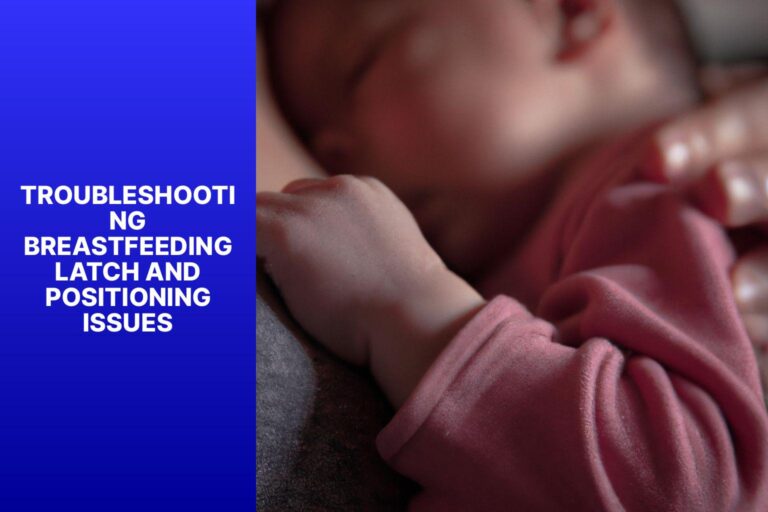Why Every Drop Counts: Is One Ounce of Breast Milk a Day Beneficial?
Breast milk is the safest and healthiest drink you can give a baby. It has all the vital nutrients that a growing infant needs to stay strong and prevent unwanted diseases. It also has fantastic benefits for the breastfeeding mother.
Breast milk contains necessary nutrients such as protein, fat, and lactose. It also includes your child’s daily dose of vitamins and minerals.
For many moms, breastfeeding comes naturally, and their milk supply never seems to run dry. However, other mothers may find difficulty in producing breast milk at a rapid pace, especially when there is an underlying issue. But how much breast milk does your baby need, and how beneficial is one ounce of breast milk for a tiny growing tot?
Skip To The Following Sections
How Much Milk Does a Growing Baby Need?
A baby’s need is constantly changing as they grow older. A newborn will have a different feeding schedule than a 6-month-old baby. Likewise, the amount of milk a baby needs also varies, mainly once they rely on solid food.
On average, a newborn will only need 1 to 2 ounces of breast milk and around 8 to 12 feeding sessions per day. As the baby ages, the ounces rise while the feeding sessions grow more infrequent. At 6 to 12 months, a baby will need 7 to 8 ounces of breast milk but only require 4 to 6 feeding sessions.
Moms pumping and bottle-feeding their babies can quickly gauge the amount of milk their kids are consuming. For mothers who exclusively breastfeed, measuring is a bit trickier. One tip is to observe how often your baby wet their diaper. A well-fed baby should soil their diaper twice to thrice a day during their first few days and five to six times past 5 days old.
Breastmilk By Age Chart
Age (Months) | Average Daily Breast Milk Intake (oz/ml) | Number of Feedings Per Day | Approx. Ounces Per Feeding (oz/ml)
0-3 months 19-30 oz (540-900 ml) 8-12 1.5-4 oz (45-120 ml)
4-6 months 19-30 oz (540-900 ml) 6-8 2.5-5 oz (75-150 ml)
7-9 months 19-30 oz (540-900 ml) 4-6 4-7.5 oz (120-225 ml)
10-12 months 19-30 oz (540-900 ml) 3-5 4-10 oz (120-300 ml)
Is One Ounce of Breast Milk a Day Beneficial?
One ounce (29 ml) of breast milk for a growing baby is not enough, especially once they are 2 weeks and beyond. A baby’s appetite increases as they grow older and will require more nutrients to continue growing. However, one ounce of breast milk is more beneficial than no milk at all.
Breast milk has disease-fighting antibodies that can keep babies from getting ill. Even as little as 1.6 ounces (50 ml) is enough to help a baby fight off sicknesses.
What Makes Breast Milk So Nutritious?
Many pediatricians promote breastfeeding as the best way to nurse a baby. But what is in breast milk that makes it so nutritious and beneficial?
The nutritional content of breast milk varies from mother to mother. Many factors, such as the baby’s age or the mother’s diet, can change the consistency of breast milk. On average, moms between 2 to 6 weeks postpartum produce around 65 calories, 6.7 g carbohydrates (primarily lactose), 3.8 g fat, and 1.3 g protein per 100 ml breast milk. Breast milk also contains other constituents, such as cholesterol, calcium, vitamin C, magnesium, and more.
Besides fighting acute illnesses and providing energy, breast milk can also help prevent chronic and long-term diseases. Breastfed babies have a lower risk of developing asthma, obesity, type-1 diabetes, and sudden infant death syndrome (SIDS).
There is no doubt that breast milk is beneficial for a baby. But breast milk also has positive impacts on mothers. These include improving mental health and providing relaxation, lowering the risk of breast and ovarian cancer, and pushing moms and babies closer to one another.
Is 1 Oz. of Milk Per Pumping Session Normal?
Some mothers can only pump 1 ounce of breast milk every three hours. While the amount seems all, this is an average amount, according to Milkology. In fact, the typical amount for many pumping mothers is around 0.5 to 2 ounces for both breasts.
Pumping is different from breastfeeding. Breast pumps are not as efficient as getting milk like a real baby can, so don’t be scared that your milk supply might be too low.
Different factors also affect the amount of breast milk you can pump. Controllable elements such as the time of day, your emotional state, or your pump’s quality can either increase or decrease your milk supply. But uncontrollable factors like your baby’s age can also play a role in your production.
How Can I Increase My Breast Milk Supply?
Low milk supply is a common issue for breastfeeding mothers, and many want to know how they can increase their supply naturally. Mothers can quickly increase their milk supply by doing the following:
- Try to nurse as frequently as possible. Mothers should aim to breastfeed every 2 to 3 hours during the day and every 3 to 4 hours at night.
- Provide your baby ample time to breastfeed on each breast. Aim for around 15 minutes and more per each breast.
- Wake your baby up if they fall asleep while breastfeeding and provide the other breast.
- Massage your breast before and after breastfeeding.
- If you use a breast pump, breastfeed your baby on one breast while pumping with the other.
- Ensure that your baby has a deep latch on your breast. A shallow latch can cause pain and discomfort, and your baby will not receive as much milk as they should.
- Warm your breast up before feeding. You can use a warm cloth or have a shadow before nursing your baby. You can also use vibration to stimulate your breast while breastfeeding and pumping.
- Find a comfortable position where you and your baby can experience a lot of skin-to-skin contacts.
If you still have difficulties increasing your milk supply, you might be experiencing a true low milk supply. Talk to your doctor or a lactation consultant about improving your milk supply.
Breastfeeding Challenges and Solutions
Breastfeeding is a natural and beneficial way to nourish your baby, but it can come with its share of challenges. New parents often encounter various difficulties as they embark on their breastfeeding journey. Fortunately, many of these challenges can be addressed with the support of healthcare providers, lactation consultants, and a good understanding of infant feeding needs.
- Low Milk Supply: Some mothers may worry about not producing enough milk to meet their baby’s needs. Low milk supply can be due to various factors, including the baby’s latch, hormonal imbalances, or infrequent feedings. Lactation consultants and healthcare providers can assess and provide guidance on increasing milk production.
- Latching Issues: A proper latch is crucial for successful breastfeeding. Babies may struggle with latching, causing discomfort or inadequate milk transfer. Lactation experts can help assess and improve latching techniques to ensure a comfortable and efficient feed.
- Growth Spurts: Babies go through growth spurts, often during the early months. During these times, they may seem hungrier and want to nurse more frequently. Understanding these normal patterns can help reassure parents that their baby’s increased demand for milk is temporary.
- Introduction of Solid Food: Around six months of age, infants begin to transition to solid foods while still relying on breast milk or formula. Parents may find it challenging to strike the right balance between breast milk and solids. Pediatricians and healthcare providers can offer guidance on when and how to introduce solid foods.
- Sore Nipples: Many breastfeeding mothers experience nipple soreness, especially in the early days. Proper latch and positioning, as well as nipple care, can help alleviate discomfort.
- Pumping and Bottle Feeding: For mothers who return to work or need to express breast milk, using a breast pump is common. Learning how to use a breast pump effectively and storing expressed milk correctly are essential skills. Some babies may also need time to adjust to bottle feeding.
- Concerns About Milk Volume: Understanding how much milk a baby needs can be challenging, but lactation consultants and healthcare providers can offer guidance on assessing whether a baby is getting enough milk based on factors like diaper output, weight gain, and overall health.
- Breastfeeding and Health Conditions: Some mothers may have specific health conditions that affect breastfeeding, such as breast cancer or high blood pressure. Consulting with healthcare providers and lactation experts is vital to navigate these situations safely.
- Support Groups and Resources: Support groups and lactation services can be invaluable for new moms facing breastfeeding challenges. They provide a network of experienced parents and professionals who can offer advice, encouragement, and emotional support.
Breast Milk Storage and Handling for New Parents
Breast milk is a valuable source of nutrition for your baby, and knowing how to properly store and handle it is essential for ensuring its safety and quality. Whether you are breastfeeding exclusively, pumping, or a combination of both, here’s a comprehensive guide to managing breast milk.
- Storage Containers: Use BPA-free, sterile containers designed for breast milk storage. These can include plastic or glass bottles, breast milk storage bags, or breast milk freezer trays.
- Freshly Expressed Milk: Freshly expressed breast milk can be stored at room temperature (77°F or 25°C) for up to four hours. If the temperature is higher (up to 86°F or 30°C), it should be used within two hours.
- Refrigeration: Breast milk can be stored in the refrigerator at temperatures of 32-39°F (0-4°C) for up to four days. Keep it in the back of the refrigerator where it’s cooler, rather than the door.
- Freezing: Breast milk can be frozen for longer-term storage. It can be stored in the freezer compartment of a refrigerator with a separate door for up to six months, or in a deep freezer at temperatures of 0°F (-18°C) or lower for up to 12 months. Label containers with the date to ensure you use the oldest milk first.
- Thawing: When thawing frozen breast milk, do not use a microwave, as it can heat unevenly and destroy important nutrients. Instead, thaw it in the refrigerator overnight or under warm running water.
- Combining Milk: If you have expressed milk at different times, it’s safe to combine milk of different temperatures (fresh, refrigerated, or frozen), as long as you cool the freshly expressed milk before adding it to the already refrigerated or frozen milk.
- Avoid Waste: Try to store breast milk in small portions (2-4 ounces or 60-120 ml) to avoid waste. You can always add more milk if your baby needs more in one feeding.
- Use a Cooler Bag: When traveling or if you do not have access to a refrigerator, use a cooler bag with ice packs to keep breast milk cool.
- Hygiene: Always wash your hands thoroughly before expressing or handling breast milk. Clean and sterilize all pumping equipment, bottles, and containers regularly.
- Colostrum and Mature Milk: Colostrum, the first milk produced after birth, is highly nutritious. It contains antibodies and immune-boosting properties. Ensure you store and handle colostrum with the same care as mature milk.
- When to Consult a Lactation Consultant: If you have concerns about milk production, storage, or handling, consider consulting a lactation consultant. They can provide guidance tailored to your situation.
- Transition to Solid Foods: As your baby begins eating solid foods, breast milk remains an essential part of their diet. Consult with your healthcare provider or a lactation expert to understand how to balance breast milk and solids effectively.
- Exclusive Breastfeeding: Exclusive breastfeeding is recommended by the American Academy of Pediatrics and the World Health Organization for the first six months of a baby’s life. Proper storage and handling of breast milk are crucial during this period.
Remember, breast milk is often referred to as “liquid gold” because of its numerous health benefits and its role in promoting your baby’s health and development. By following proper storage and handling guidelines, you can ensure that your baby receives the full nutritional benefits of your breast milk.
FAQ:
Will my breast milk change in consistency and nutrition as time goes on?
Your baby’s age can affect your breast milk and how you breastfeed. Your breast milk’s content and amount shift and adapt based on your kid’s needs.
Why does frequent pumping/breastfeeding increase my milk supply?
Breastfeeding and pumping stimulate the breasts and releases the hormones prolactin and oxytocin, which are responsible for breast milk production. The more prolactin and oxytocin, the more breast milk in your breasts.









